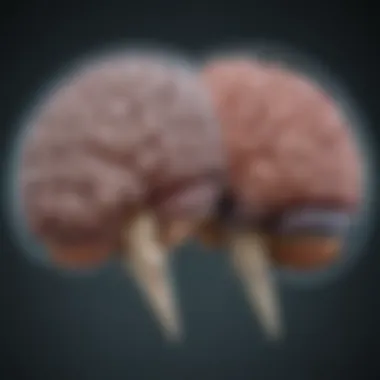Understanding the Link Between Schizophrenia and Sleep


Intro
The relationship between schizophrenia and sleep disturbances is intricate and multifaceted. Researchers have identified that individuals with schizophrenia often experience significant sleep issues, which can exacerbate symptoms and complicate treatment strategies. This connection warrants comprehensive exploration, as understanding these dynamics can lead to improved interventions and better patient outcomes. Sleep problems are not just a byproduct of this mental illness but can influence its course and severity.
Methodology
Study Design
The complexity of the relationship between schizophrenia and sleep necessitates a carefully crafted study design. This article synthesizes findings from various observational and experimental studies, case reports, and meta-analyses. Many studies focus on longitudinal designs to track changes in sleep patterns over time in individuals diagnosed with schizophrenia. Furthermore, these studies often employ a mixed-methods approach to gather qualitative insights alongside quantifiable data.
Data Collection Techniques
To understand how sleep disturbances affect schizophrenia, researchers utilize various data collection methods. Common techniques include:
- Sleep diaries: Individuals record their sleep patterns, allowing researchers to gather firsthand accounts of sleep disturbances.
- Actigraphy: This method involves using a wrist-worn device to monitor movement patterns during sleep, providing objective data on sleep quality and duration.
- Polysomnography: Conducted in sleep laboratories, this extensive test measures brain waves, oxygen levels, heart rate, and breathing during sleep, helping to identify specific sleep disorders.
- Surveys and questionnaires: Standardized assessments help evaluate sleep quality and the presence of psychiatric symptoms.
These techniques form a foundation to explore the nuances of sleep and schizophrenia in depth.
Discussion
Interpretation of Results
The research illuminates several key findings regarding how sleep disturbances interact with schizophrenia. Many individuals experience disrupted sleep architecture, characterized by reduced REM sleep and increased wakefulness during the night. This disruption can exacerbate cognitive deficits and affect emotional regulation, leading to worsened outcomes overall.
Additionally, effective sleep management can ameliorate some symptoms of schizophrenia. Studies show that prioritizing quality sleep can lead to better adherence to treatment, fewer relapses, and improved daily functioning.
Limitations of the Study
Despite advancements in this field, several limitations persist. First, many studies rely heavily on self-reported data, making them susceptible to bias or inaccurate recollections. Furthermore, the diversity of symptoms observed between different individuals with schizophrenia can complicate the generalizability of findings. Not all sleep disturbances are the same, and responses to treatments can vary widely.
Future Research Directions
Looking ahead, there is room for further investigation into the bidirectional nature of this relationship. More research should focus on:
- The molecular and neurophysiological mechanisms underlying sleep disturbances in schizophrenia.
- Longitudinal impacts of various therapeutic interventions on both sleep and psychiatric symptoms.
- The role of lifestyle factors, such as exercise and diet, on sleep quality among patients with schizophrenia.
Expanding the depth of research in these areas can lead to innovative therapeutic strategies that better address the integrated needs of affected individuals.
By deepening our understanding of how schizophrenia interacts with sleep, we can develop enhanced therapeutic avenues that not only address symptoms of the disorder but also foster improvements in overall well-being.
As we combine insights from various studies, we move closer to achieving a holistic understanding of schizophrenia and the sleep disturbances that often accompany it.
Understanding Schizophrenia
Understanding schizophrenia is crucial to explore its relationship with sleep. Schizophrenia is not simply a single disorder; it encompasses a spectrum of symptoms and subtypes that complicate both diagnosis and management. Knowing the basics of this mental illness can help professionals develop effective therapeutic strategies, particularly when addressing associated sleep disturbances.
Definition and Overview
Schizophrenia is a pervasive mental disorder characterized by distorted thinking, perceptions, emotions, language, and behavior. Individuals often experience hallucinations, delusions, and disorganized thought processes. The complexity of this disorder makes it challenging for those affected, as well as for their families and caregivers.
In its essence, schizophrenia disrupts the ability to differentiate between what is real and what is not. This can lead to significant impairment in daily functioning and social interactions. Understanding the definition and manifestations of schizophrenia is the first step in identifying its links to sleep disorders.
Epidemiology and Prevalence
Schizophrenia affects approximately 1% of the global population. However, prevalence rates can vary significantly across different regions and demographics.
- Age of Onset: Onset typically occurs in late adolescence to early adulthood, although it can develop later in life.
- Gender Differences: Males usually experience an earlier onset than females, yet females may experience more severe symptoms later on.
- Cultural Factors: Cultural background can influence the perception of symptoms, often leading to variability in diagnosis and treatment approaches.
Understanding the epidemiology of schizophrenia provides insight into how widespread the issue is and the demographic factors that may influence its presentation.


Symptoms and Subtypes
Recognizing the symptoms and subtypes of schizophrenia is vital for both diagnosis and treatment. Symptoms are commonly categorized into positive and negative types:
- Positive Symptoms: These include hallucinations, delusions, and thought disorders. They represent an excess or distortion of normal functioning.
- Negative Symptoms: These involve reduced emotional expression, lack of motivation, and social withdrawal. They reflect a decrease in normal function.
Subtypes of schizophrenia, including paranoid, disorganized, and catatonic, describe the specific presentations and varying symptom profiles that can influence the experience of sleep disturbances.
Understanding these elements aids researchers and healthcare professionals in creating effective treatment plans. The interplay between schizophrenia and sleep cannot be overlooked, as sleep disturbances may exacerbate symptoms.
"It’s essential not only to recognize the symptoms of schizophrenia but also to understand how they interrelate with sleep patterns to devise comprehensive care strategies."
Consequently, informed management of schizophrenia has potential to improve overall quality of life and therapeutic outcomes for individuals affected by this complex disorder.
The Role of Sleep in Mental Health
Sleep serves a pivotal role in maintaining mental health. Its intricate relationship with psychological well-being cannot be overstated. For individuals dealing with schizophrenia, the dynamics of sleep become even more complex.
Adequate sleep is essential for cognitive function, emotional regulation, and overall health. When sleep quality deteriorates, so do these essential mental processes. This relationship highlights not just a correlation, but a bidirectional influence between sleep and mental health. Specifically, sleep disturbances can exacerbate symptoms of schizophrenia, while the disorder itself can lead to irregular sleep patterns.
Maintaining healthy sleep can provide several benefits:
- Improved Cognitive Function: Quality sleep enhances memory, learning, and problem-solving abilities.
- Emotional Stability: Good sleep contributes to emotion regulation, reducing irritability and mood swings often seen in schizophrenia.
- Enhanced Medication Effectiveness: Some treatments may work better when the patient has consistent sleep patterns.
It is essential to consider sleep as a significant part of mental health treatment. By recognizing its importance, mental health professionals can better address sleep issues in their patients.
Sleep Architecture and Phases
Understanding sleep architecture is crucial in the study of sleep's role in mental health. Sleep is not a uniform state but instead consists of multiple phases, primarily categorized into REM (Rapid Eye Movement) and non-REM sleep. Each phase has distinct functions and impacts body and brain.
- Non-REM Sleep: This phase involves several stages, from light sleep to deep sleep. Deep sleep, or slow-wave sleep, is vital for physical restoration and memory consolidation.
- REM Sleep: This phase is associated with vivid dreaming. It plays a critical role in emotional processing and mood regulation.
Research indicates that individuals with schizophrenia often experience disrupted sleep architecture, characterized by reduced deep sleep and altered REM patterns. These disruptions can lead to a range of symptoms, exacerbating the challenges faced by individuals with this disorder.
Consequences of Sleep Deprivation
Sleep deprivation leads to a multitude of negative consequences that can further complicate the experience of schizophrenia. Lack of sleep affects cognitive and emotional functioning. Its immediate and long-term effects include:
- Cognitive Impairments: Difficulty concentrating, memory issues, and reduced decision-making abilities.
- Emotional Disturbances: Increased anxiety, heightened emotional responses, and enhanced irritability.
- Exacerbation of Symptoms: Sleep deprivation can worsen psychotic symptoms, including hallucinations and delusional thoughts.
The interplay between sleep deprivation and symptoms of schizophrenia reveals the need for effective interventions. Addressing sleep issues can help in managing overall health and improving quality of life for affected individuals.
Sleep Disturbances in Schizophrenia
Sleep disturbances hold a significant role in understanding schizophrenia. The interaction between these disturbances and the mental illness can create a complex feedback loop. Individuals with schizophrenia often experience various sleep disorders, which can complicate their treatment and management. Recognizing these sleep-related issues is essential. It not only aids in improving the quality of life for those affected but also enhances overall treatment efficacy. Understanding sleep disturbances can lead to targeted therapeutic strategies that address both schizophrenia and its associated sleep issues.
Common Sleep Disorders
People with schizophrenia frequently encounter a range of sleep disorders. These can include:
- Insomnia: Difficulty falling or staying asleep is prevalent. It can worsen the negative symptoms of schizophrenia.
- Hypersomnia: Some may experience excessive daytime sleepiness, impacting daily functioning.
- Sleep Apnea: Disordered breathing during sleep can be a hidden issue. It often goes undiagnosed and contributes to feelings of fatigue.
- Restless Legs Syndrome: This condition can cause discomfort, making it hard for individuals to relax and rest properly.
Identifying these disorders is vital. They can exacerbate the symptoms of schizophrenia, leading to increased instability in mood and cognition. Effective management of these sleep issues should be integrated into care plans for individuals with schizophrenia.
Impact on Cognitive Function
Sleep deprivation negatively affects cognitive function for anyone, but it is particularly detrimental for individuals with schizophrenia. Cognitive deficits may include issues with attention, memory, and executive function. These problems are crucial as they intertwine with the core challenges of schizophrenia.
Poor sleep can exacerbate cognitive impairments. Studies show that when individuals with schizophrenia do not get adequate sleep, they are more likely to experience:


- Difficulty focusing: Tasks requiring concentration become overwhelming.
- Memory lapses: Challenges with recalling information can increase frustration.
- Reduced problem-solving abilities: Unresolved issues see no resolution due to impaired thinking.
Enhancing sleep quality can lead to improvements in cognitive performance. Thus, addressing sleep disturbances is not just a matter of comfort; it is a necessity for achieving better overall mental health outcomes for those with schizophrenia.
Links to Psychotic Episodes
A critical relationship exists between sleep disturbances and psychotic episodes in individuals with schizophrenia. Sleep is essential for emotional regulation and cognitive clarity. Disruptions in sleep can trigger or worsen psychotic episodes, causing increased distress.
Research indicates that a lack of sleep can lead to:
- Increased hallucinations: Sensory perceptions without external stimuli may intensify during periods of sleep deprivation.
- Paranoia: Sleep issues can lead to heightened feelings of mistrust and anxiety in daily situations.
- Symptoms of relapse: For those in recovery, poor sleep can indicate a potential return to more severe symptoms.
Understanding this connection can inform treatment strategies. Interventions aimed at improving sleep could lead to a decrease in the frequency and severity of psychotic episodes, potentially reshaping the approach to treating schizophrenia.
Addressing sleep issues may significantly reduce symptoms and improve treatment outcomes for individuals with schizophrenia.
By examining these aspects, we can better understand how sleep disturbances intertwine with schizophrenia and the importance of addressing these issues systemically.
Biological Underpinnings
Understanding the biological underpinnings of schizophrenia and how they relate to sleep is critical for grasping this complex interplay. Schizophrenia is not solely a psychological disorder; it has deep biological roots that affect sleep patterns significantly. Various elements such as neurotransmitter systems and circadian rhythms play essential roles in how individuals experience both schizophrenia and sleep disturbances.
Research indicates that addressing these biological aspects can lead to better treatment outcomes. Recognizing the connections between brain chemistry and sleep can facilitate a more tailored approach to managing schizophrenia. This section will explore two primary components: neurotransmitter systems and circadian rhythms, which are fundamental to understanding how sleep and mental health are intertwined.
Neurotransmitter Systems
Neurotransmitters are chemicals that facilitate communication between neurons in the brain. In the context of schizophrenia, several key neurotransmitters, including dopamine, serotonin, and glutamate, are of paramount importance.
- Dopamine: This neurotransmitter is often linked to the positive symptoms of schizophrenia, such as hallucinations and delusions. Studies suggest that imbalances in dopamine levels may disrupt normal sleep architecture, leading to sleep disorders which are common in schizophrenia patients.
- Serotonin: Serotonin is crucial for mood regulation and can also affect sleep patterns. Alterations in serotonin signaling can lead to changes in sleep stages, predominantly affecting REM sleep, which is vital for emotional regulation and cognitive function.
- Glutamate: As the primary excitatory neurotransmitter, glutamate is believed to play a role in cognitive processes and perception. Dysregulation of glutamatergic activity has been associated with sleep disturbances as well.
By examining these neurotransmitter systems, we gain insight into how they contribute to both the pathology of schizophrenia and its impact on sleep quality and disturbances.
Circadian Rhythms and Schizophrenia
Circadian rhythms refer to the natural cycles that govern many physiological processes, including the sleep-wake cycle. Disruptions in circadian rhythms can have a profound impact on individuals with schizophrenia.
- Biological Clock: The suprachiasmatic nucleus in the hypothalamus acts as the body's master clock. In schizophrenia, this clock may function abnormally, leading to irregular sleep patterns and sleep deprivation.
- Sleep Timing: Many individuals with schizophrenia experience changes in their preferred sleep times, often exhibiting delayed sleep phase disorder. This can complicate daily functioning and contribute to worsening mental health.
- Light Exposure: Environmental factors such as light exposure can significantly influence circadian rhythms. Individuals with schizophrenia may have altered sensitivity to light, affecting their ability to maintain regular sleep schedules.
Understanding circadian rhythms in schizophrenia can highlight potential intervention strategies, such as light therapy, to restore proper sleep patterns.
"Biological factors in schizophrenia offer critical insights necessary for developing effective therapies and improving patient outcomes in relation to sleep health."
Assessment of Sleep in Schizophrenia
Assessing sleep in individuals with schizophrenia is crucial. Sleep patterns in these patients are often disrupted, and understanding this aspect can significantly impact treatment outcomes. The interplay between sleep and schizophrenia creates a cycle where poor sleep exacerbates symptoms, and the symptoms can lead to further sleep disturbances. Therefore, a thorough assessment is essential for effective management.
Diagnostic Tools and Techniques
Several diagnostic tools and techniques exist for evaluating sleep in individuals with schizophrenia. Polysomnography, for example, is a comprehensive clinical tool that provides extensive data on sleep architecture. It measures brain waves, oxygen levels, heart rate, and breathing, allowing clinicians to observe the different sleep stages and any abnormalities.
Actigraphy is another technique used. It involves a wrist-worn device that tracks movement. It is less intrusive than polysomnography and can provide insight into sleep patterns over a more extended period. This technique can be particularly beneficial when evaluating a patient's sleep habits in their natural environment. Additionally, subjective approaches such as the Pittsburgh Sleep Quality Index can offer valuable insights into patients’ perceptions of their sleep quality.
Patient Self-Reporting
Patient self-reporting is an essential component in assessing sleep in schizophrenia. Self-reported data can reveal discrepancies between objective and subjective sleep quality. Patients might express feeling unrested even with a full night's sleep. Gathering this type of information aids in tailoring treatments to individual needs.
Self-reporting can be facilitated by sleep diaries or questionnaires. These tools can help monitor sleep habits across days or weeks and assist in capturing patterns that may not be evident during clinical assessments. However, it is important to consider that self-reports may be influenced by cognitive deficits associated with schizophrenia. Thus, a multi-faceted approach, combining subjective reports with objective assessments, ensures a more comprehensive understanding of each patient's sleep dynamics.
"Sleep disorders are prevalent among individuals with schizophrenia, and their assessment is paramount for effective treatment strategies."


Therapeutic Implications
Understanding the therapeutic implications of sleep disturbances in schizophrenia is crucial. This knowledge directly influences how clinicians approach treatment strategies and improve patient outcomes. The interaction between schizophrenia and sleep is significant. Poor sleep can exacerbate symptoms of schizophrenia, leading to a cyclical pattern of distress that complicates the management of the condition. Hence, any discussion of treatment must take into account these interconnected factors.
There are several key elements that merit attention in this context:
- Bi-directional Relationship: Sleep issues can worsen schizophrenia symptoms. Conversely, engaging with effective sleep management techniques can lead to improvements in overall mental health.
- Quality of Life: Addressing sleep disorders can greatly enhance the quality of life for individuals suffering from schizophrenia. Better sleep often correlates with improved mood, cognition, and social functioning.
- Treatment Adherence: When sleep disturbances are acknowledged and treated, patients may be more likely to adhere to their primary treatment plans, including medication protocols.
"A comprehensive approach that includes sleep assessment may pave the way for more effective management of schizophrenia."
Additionally, understanding sleep's role can foster a holistic view of patient care. Treatment must be tailored to address both the psychiatric and sleep-related facets of the illness. This integrated perspective often results in better therapeutic outcomes.
In summary, acknowledging and treating sleep disturbances in schizophrenia is not just advisable, but necessary. It enables a more effective and comprehensive treatment strategy.
Pharmacological Interventions
Pharmacological interventions frequently play a prime role in the management of sleep disruptions in schizophrenia. Several medications address both symptoms of schizophrenia and sleep issues simultaneously. Examples include:
- Antipsychotics: Drugs like olanzapine and quetiapine may improve sleep quality while managing psychotic symptoms.
- Sleep Aids: Medications such as zolpidem and trazodone can be used cautiously, ensuring that the prescriptions do not interfere with existing treatment plans.
Each medication comes with its own set of risks and side effects. It is essential for healthcare professionals to monitor these effects and adjust treatments as needed.
In some cases, psychopharmacology may not be sufficient alone. Thus, a combined approach is often beneficial.
Cognitive Behavioral Therapy
Cognitive Behavioral Therapy (CBT) is another vital intervention focused on treating sleep problems in patients with schizophrenia. CBT for insomnia (CBT-I) is a structured program that helps individuals identify and replace thoughts and behaviors that cause or worsen sleep problems with habits that promote sound sleep.
Some important aspects of CBT include:
- Identifying Triggers: Recognizing stressors that impact sleep can lead to tailored interventions.
- Coping Strategies: Individuals learn valuable coping mechanisms to manage anxiety and stress, which contributes to better sleep hygiene.
- Behavior Modification: Adjustments in daily routines and behaviors may improve sleep patterns.
Research supports that CBT can lead to significant improvements in both sleep quality and psychiatric symptoms in schizophrenia. This dual benefit highlights the need for incorporating therapeutic techniques that directly address sleep disturbances in a comprehensive treatment plan.
Future Directions in Research
Innovations in Treatment Approaches
The treatment landscape for schizophrenia is gradually changing as researchers gain insights into the sleep disturbances associated with the disorder. Innovative approaches such as integrated therapies combining sleep management with traditional antipsychotic treatments have shown promise. For instance, methods like the use of melatonin or bright light therapy might enhance the quality of sleep for those suffering from schizophrenia. This shift can potentially reduce the severity of symptoms and improve the overall well-being of patients.
Moreover, advancements in technology, such as wearable sleep trackers and mobile health applications, can play a role in monitoring sleep patterns effectively. By leveraging these tools, clinicians can tailor interventions more precisely to individuals, improving adherence to treatment and outcomes. It is crucial for researchers to explore how technology can bridge the gap between traditional treatment modalities and personalized care plans, enabling a better understanding of patients' sleep needs.
Longitudinal Studies on Sleep and Schizophrenia
Longitudinal studies are vital for establishing causal relationships between sleep disturbances and schizophrenia over time. These studies can track the progression of sleep disorders in individuals diagnosed with schizophrenia, thus providing insights into how sleep patterns might influence the onset or exacerbation of psychotic episodes. By analyzing data from these studies, researchers can formulate strategies tailored to mitigate sleep disruptions, potentially leading to better management of schizophrenia symptoms.
Long-term research can also assess whether improving sleep quality leads to favorable outcomes in mental health. The findings from such studies could inform clinical guidelines and shape future interventions.
"Understanding sleep impairment in schizophrenia could lead to significant advancements in treatment outcomes and quality of life for individuals suffering from this complex disorder."
As we continue to delve into the intricate web connecting sleep and schizophrenia, it becomes evident that the interventions informed by rigorous research could fundamentally transform patient experiences. By focusing on the intricacies of sleep and its relation to schizophrenia, we aim for a future with more effective and compassionate care.
Epilogue
Summary of Key Findings
In analyzing the interaction between schizophrenia and sleep, several important findings emerge:
- Prevalence of Sleep Disorders: Research indicates that sleep disturbances are common in individuals diagnosed with schizophrenia. These can range from insomnia to hypersomnia, affecting overall quality of life.
- Impact on Cognitive Function: Sleep disruptions can impair cognitive functions such as memory, attention, and executive function, contributing to the challenges faced by these patients.
- Psychotic Episodes: A lack of quality sleep is linked to an increased risk of psychotic episodes. Understanding this connection is paramount for both preventative and responsive treatment approaches.
- Biological Underpinnings: Neurotransmitter imbalances and dysregulated circadian rhythms play a role in both schizophrenia and sleep disorders, suggesting a biological basis for their relationship.
Relevance for Mental Health Practice
This article's findings underscore the necessity of integrating sleep assessments into clinical practice for mental health professionals working with schizophrenia patients. Here are a few important considerations:
- Holistic Approach: Mental health practitioners must adopt a more holistic approach to treatment, considering sleep as an integral component of a patient's overall mental health status.
- Targeted Interventions: Understanding the specific sleep disorders associated with schizophrenia allows for more targeted pharmacological and therapeutic interventions.
- Patient Education: Educating patients about the importance of sleep hygiene can improve outcomes and enhance their quality of life.
- Future Research: Ongoing studies focused on the connection between sleep and schizophrenia can inform future clinical guidelines and therapeutic approaches.







